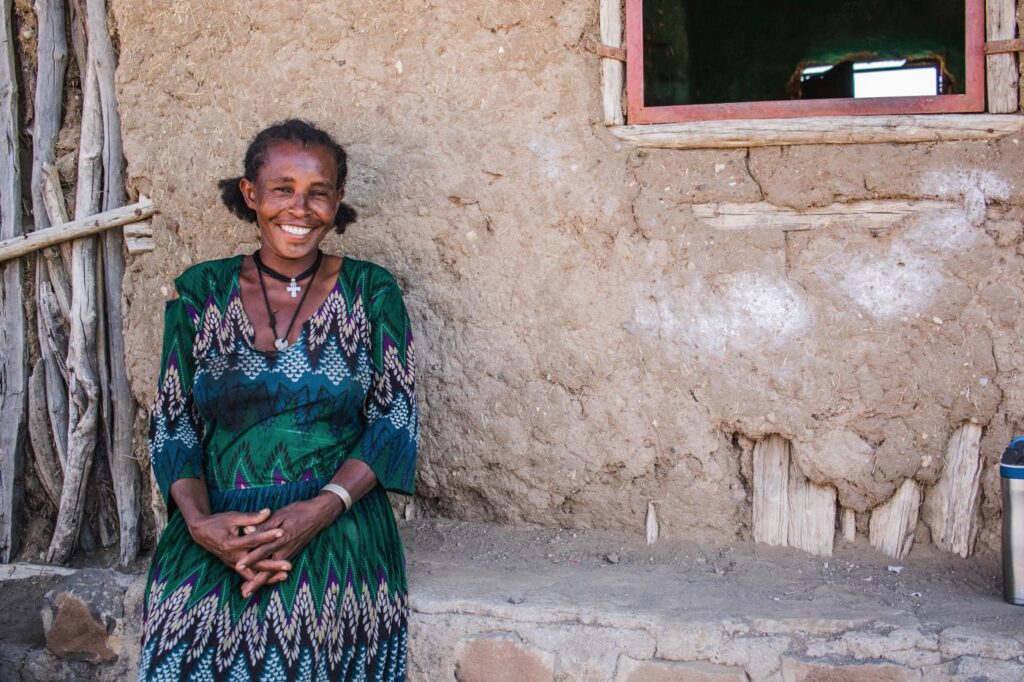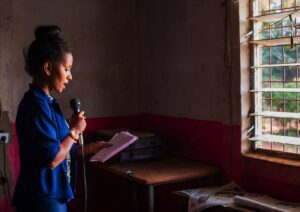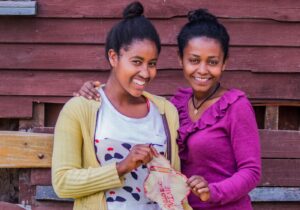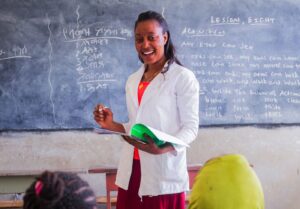Degib kebele is deep into East Belesa woreda, far removed from paved roads and supply lines for water and electricity. The kebele, much like the larger woreda, is hot and arid with just about two months of rain per year. Tsehaynesh Melkamu is 39 years old, and she has been living in Degib all her life. Before she and her ex-husband divorced, they had had five children all of whom are boys. Tsehaynesh is one of thousands of beneficiaries from SWEEP, a project implemented by CARE through the financial support of the Austrian Development Agency, which as part of its objective aims to increase household access to water in East and West Belesa by implementing sustainable water resource management and environmental conservation practices in the communities.
Prior to the water reservoir SWEEP installed which can hold up to 26,000 liters of water solar pumped from shallow wells, all of Degib including Tsehaynesh struggled to find a water source. “The nearest water source would be nearly five hours away! We would have to leave our infants unattended just to go fetch water. And even when we get there, the water is often littered with animal waste and other pollutants because it’s well water,” says Tsehaynesh, describing the reality of nearly every household in Degib before the construction of the reservoir in 2019.
Tsehaynesh’s life, as well as those of her sons, changed drastically when the water supply system was installed and water was distributed throughout the kebele including to Tsehaynesh’s doorstep. “Access to clean water gives new meaning to life! Things we now take for granted like taking regular baths each day and growing backyard gardens were unheard of just a year or so ago,” reminisces Tsehaynesh, thinking of a much harder time for her family.
As a means of income, Tsehaynesh raises cattle and sells them for profit. She also has a small farmland she previously neglected with which her sons help till and farm. Whereas she previously relied on seasonal rain, which is unpredictable in its timing and intensity, now she relies on water from the excess of the reservoir for her farmland and takes farming far more seriously than she used to. “I would keep my sons from school to help me dig wells so I could water the land with well water. Not only did they miss school, but it was physically taxing digging and transporting the water,” adds Tsehaynesh. Now, she has easy access to clean water to use on her land from the distribution lines that supply from the reservoir straight to her doorstep. Her harvest has also nearly doubled in quantity, and because she no longer solely relies on rainwater, she is looking forward to harvesting twice in a year for the first time in her life. Having two means of income that are sustainable and manageable has put Tsehaynesh on the road to resiliency with increased capacity to absorb environmental and financial shocks.
SWEEP has also installed clean water pumps within the Degib Gula School in the kebele which Tsehaynesh’s sons attend. “My boys were struggling at school and at home. If they were at school, they’d be thirsty. If they were home, they were overworked helping me fetch water. Our story is different now. Degib is different now. Previously we only thought of sustaining life, surviving. But now, we see hope and possibilities both for ourselves and our children,” she says.
The installation of the reservoir and the water supply system truly has changed life in Degib and lives like that of Tsehaynesh are testament to its success. Especially for East and West Belesa where female headed households are far too common, interventions like SWEEP that sustainably supply basic resources like water have a tremendous impact on the productivity and food-security of households in the community. The SWEEP project has benefited more than 180,000 chronically food insecure and drought affected people of East and West Belesa woredas in Central Gondar zone of Amhara regional state, of which 50% of the project beneficiaries are people of marginalized groups including people with disabilities, women, and girls.






